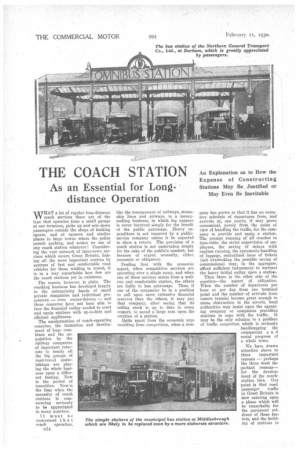THE COACH STATION
Page 148

Page 149

If you've noticed an error in this article please click here to report it so we can fix it.
As an Essential for Long distance Operation
WHAT a lot of regular long-distance coach services there are of the type that operates from a small garage at one terminus, picks up and sets down passengers outside the shops of booking agents, and at squares and similar places in large towns where the police permit parking, and makes no use of any coach station whatever Considering the vast network of inter-town services which covers Great Britain, linking all the more important centres by systems of fast and comfortable road vehicles for those wishing to travel, it is in a way remarkable how few are the coach stations yet in existence.
The reason, however, is plain. The coaching business has developed largely in the enterprising hands of small private companies and individual proprietors — even owner-drivers — and these concerns have not been able to face the financial outlay needed to erect and equip stations with up-to-date and efficient appliances.
It must be understood that coach operation, D54
like the management of railways, steamship lines and airways, is a moneymaking business, in which big expense is never incurred simply for the benefit of the public patronage. Heavy expenditure is not incurred by a publicservice company unless it be expected to show a return. -The provision of a coach station is not undertaken simply for the sake of the public's comfort, but because of urgent necessity, either economic or obligatory.
Dealing first with the economic aspect, when competitive services are operating over a single route, and when one of these services starts from a wellrun and comfortable station, the others are liable to lose patronage. Thus, if one of the companies be in a position to call upon more extensive financial reserves than the others, it may pay that company, after seeing that its rolling stock is up to date in every respect, to spend a large sum upon the erection of a station.
Quite apart from the economic urge resulting from competition, when a corn
patty has grown so that it has an extensive schedule of departures from, and arrivals at, one centre, it may prove economical, purely from the point of view of handling the traffic, for the company to provide and equip a station. The prompt running of all coaches to time-table, the strict supervision of employees, the saving of delays with engines running, the systematic handling of luggage, centralized issue of tickets (not overlooking the possible saving of commissions) may, in the aggregate, afford sufficient inducement to warrant the heavy initial outlay upon a station.
Then there is the other side of the question—the aspect of obligation. When the number of departures per hour or per day from one terminal point and the number of arrivals from remote termini become great enough to cause obstruction in the streets, local authorities may insist upon the operating company or companies providing stations to cope with the traffic, it may be the only solution to a problem of traffic congestion which is seriously
handicapping the commercial a 11 d social progress of a whole town.
We have drawn attention above to three important reasons — perhaps the three most important reasons— for the development of the coachstation idea. Our point is that road passenger traffic in Great Britain is now entering upon a phase which will be remarkable for the persistent evidence of these fac Middlesbro ugh tore, and the build rate structure. ing of stations in
all important coaching centres will be the only solution to the problem. In areas of the strongest competition, other conditions being equal, the companies that first awaken to the advantages of operating from pleasant—in fact, attractive—stations are those that will the better withstand the anxious times to follow.
The obvious line of development is, to soar way of thinking, one of coordination in meeting the inevitable expense. A. coach proprietor operating
a regular service southward from a certain centre, and possibly suffering already the effects of competition, should seek to come to an arrangement with other proprietors woibking upon routes northward, eastward and westwarel.from the same centre. Pooling their resources, the three or fourconcerns. can then rent, purchase or construct suitable premises, formulate inter-connecting time-tables and arrangeinter-availability of tickets. Without much difficulty they can provide, for the
inhabitants of their particular town such a quality of service and such dotefort and efficiency of travel as will place their rivals at a disadvantage.
The undertaking is not so fraught with difficulties as it at first appears, and we foretell that those who do not look ahead in this respect of their own free will, will ere long find themselves brought face to face with the question of providing coach-station facilities— probably at •a time when it is too late to recover a waning business.




























































































































































































































